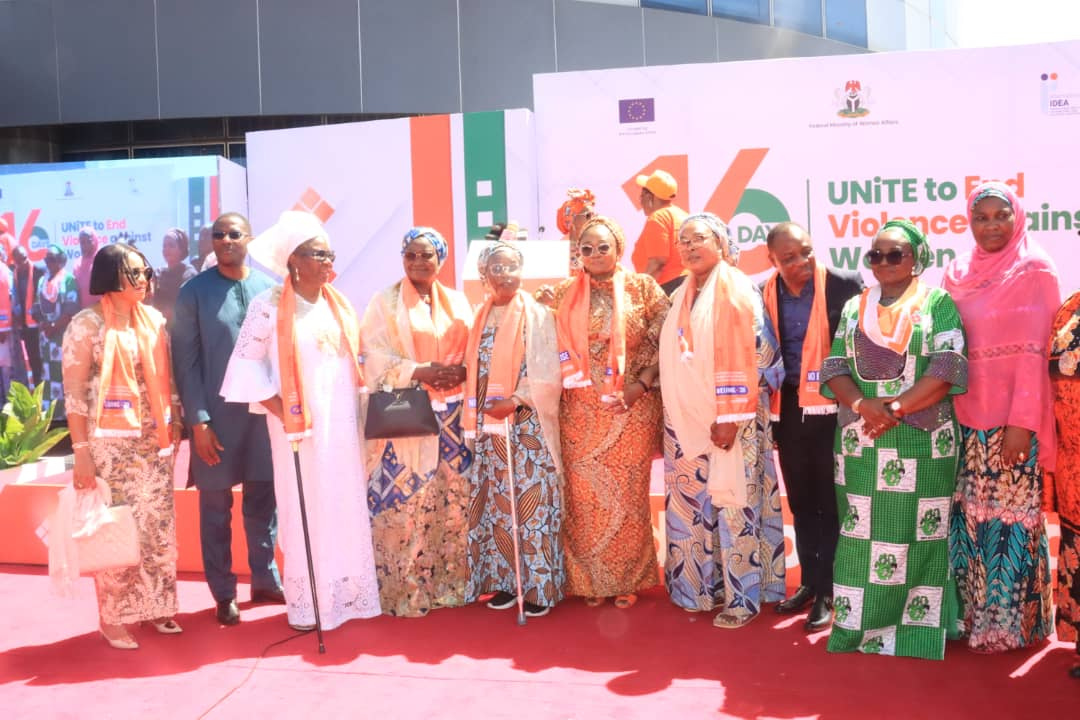Maureen Okpe
The Minister of Women Affairs, Hajiya Imaan Suleiman-Ibrahim have expressed disapproval of any form of violence against women and girls noting, the menace is not inevitable but preventable.
Hajia Suleiman-Ibrahim stated this in her address on Monday, in Abuja, at the Joint press briefing and flag off activities in commemoration of the 2024, 16 days activism on elimination of Gender Based Violence(GBV), with theme, ‘Towards Beijing +30: UNiTE to End Violence Against Women and Girls.’
The Minister emphasized the importance for collaborative efforts in amplifying the voices of women, demand action, and strengthen the resolve to end violence against women and girls in Nigeria.
She said, “Gender-based violence is not just a women’s issue; it is a societal issue, a human rights issue, and an impediment to our nation’s development.
“The statistics before us on gender-based violence in Nigeria remain deeply troubling. Even as we embark on this campaign today, somewhere in a community, a little child has just violated, a woman has just been abused, a young girl’s life is at risk, all for no just cause. Current Reports indicate that 30% of Nigerian women and girls aged between 15 to 49 have experienced physical or sexual violence at some point in their lives.
“This violence occurs not only in homes, but extends to schools, workplaces, and communities. Violence does not know any tribe nor creed, it cuts across social and economic boundaries. It affects both young and old. The most vulnerable; our young girls, women in conflict-affected areas, and those living with disabilities face even greater risks.
“The growing trend is unacceptable and represents a gross violation of human rights and undermines the very fabric of our society. It prevents women and girls from achieving their full potential and hinders our nation’s progress toward inclusive development.”
The Minister urged stakeholders to adopt a multi-sectoral approach, engage men as allies, and promote education to challenge harmful cultural norms. She further announced the launch of a National Electronic Dashboard to improve data collection and ensure accountability in GBV prevention.
UN Women Country Representative
to Nigeria and ECOWAS, Beatrice Eyong, stated the need for renewed urgency in addressing gender inequality and violence against women and girls.
Eyong disclosed that, 42% of women are financially excluded, with women holding less than 5% of elective position, according to her, this imposes significant economic loss, estimated at 1.5% of Nigeria GDP annually, hindering development and progress.
She said, “Gender Based Violence is everywhere, it is not good for neither the men not the women. It has the capacity to reduce our economic growth of this is not reduced, we will never come out of poverty. It is not just a human right issue it is an economic issue.
“The funding for gender equality and women empowerment have reduced, as experts we have to think of innovative ways to mobilize funds to fight against gender based violence.”
Also, the European Union Ambassador, Gautier Mignot, represented by the Technical Lead, ROLAC, International IDEA, Toyosi Giwa noted that, the 16 days activism presents the opportunity to reflect on the evolving nature of GBV and it’s effects on victims.
Mignot reiterated the need for concerted efforts towards the fight against gender based violence, however noted that, “though more need to be done but we cannot help but commend the critical reforms that have been initiated by state government and civil society organizations, of which we have begun to see progress.
“Our advocacy must continue the work until all perpetrators are held accountable and punished and every survivor have access to assistance that they need to recover and heal.”
For his part, Permanent Secretary, Federal Ministry of Women Affairs, Gabriel Aduda said, the grim reality is that, Gender-based violence (GBV) remains a pervasive issue in our societies, transcending borders, cultures, and socioeconomic status.
He noted that, “It continues to rob individuals of their dignity, undermine families, and hinder national development. In Nigeria, statistics paint a sobering picture, with a significant percentage of women and girls experiencing violence in their lifetimes. This is unacceptable, and we must act with urgency.”

